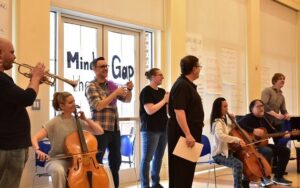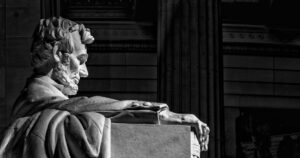History is made every moment. It really feels like that these days. More textbook worthy events have been piled into the last few years of American and global life that most people my age at least (I’m 37) could begin to remember.
This is February, and so it is Black History Month. Instantiated by scholar and publisher Carter G. Woodson in 1926, Black History Month achieved presidential recognition in 1976 during the presidency of Gerald Ford, who stated: “In the Bicentennial year of our Independence, we can review with admiration the impressive contributions of Black Americans to our national life and culture.” Congress would recognize Black History Month ten years later.
But history, like politics, is not an easy thing to talk about in today’s America. Add the element of race and it can feel nearly impossible. We have seen this dysfunction break into the realms of education and presidential politics. While Florida Governor Ron DeSantis has argued in opposition to AP African-American Studies courses that he and state officials believe traffic in ideological indoctrination through focus on Critical Race Theory, Queer Theory and prison abolition, critics of the erstwhile presidential candidate — including civil rights attorney Benjamin Crump and the Biden administration — have accused him of trying to silence black history itself.
While history should indeed inform our politics, there is something tragic in history itself being politicized. There is also the danger, when it comes to race and history, that we allow ourselves to see some histories as not also being our history as one people in the United States of America. There is a desire to honor Black history in its own right, but a need for us all to be united in honoring the family of lineages that make up America.
As I write this newsletter I find myself listening to the music of “Porgy and Bess,” introduced to me by my father, a white man. Perhaps like myself you grew up listening to the classic American song “Summertime,” which comes from this breakthrough musical set amongst the Black community of “Catfish Row” on the Waterfront of Charleston, South Carolina in the 1920’s. Through my mother I am an African-American, but with my father we all inherited the music of one of America’s first major musical productions of an all Black cast (but composed by the Jewish composer George Gershwin). This music was part of a Black history that in a larger way belonged to all of us.
Can Black history be both Black and American history at the same time? Can it unite us in understanding rather than divide us through politics?
Philosopher, DEI practitioner, founder of the Theory of Enchantment and the platform DOJO! Chloe Valdary claims that the path towards true diversity, equity, and inclusion is to “treat people like human-beings, not political abstractions.” Russell Kirk, founder of the conservative movement in America, wrote in The Conservative Mind that “reverence for the wisdom of our ancestors…is the first principle of all consistent conservative thought.” The author Ta-Nehisi Coates writes, “struggle for the memory of your ancestors. Struggle for wisdom. Struggle for your grandmother and grandfather, for your name.”
Our histories are the legacies of our ancestors. We cannot make political abstractions out of them without doing so to each other. And while there are many valid debates to be had about the policies of education, let us be humane in honoring the rivers of history from which the ocean of American identity swells…an aspect of which we dedicate special attention to in Black History Month, and all of which we honor here at Braver Angels.




